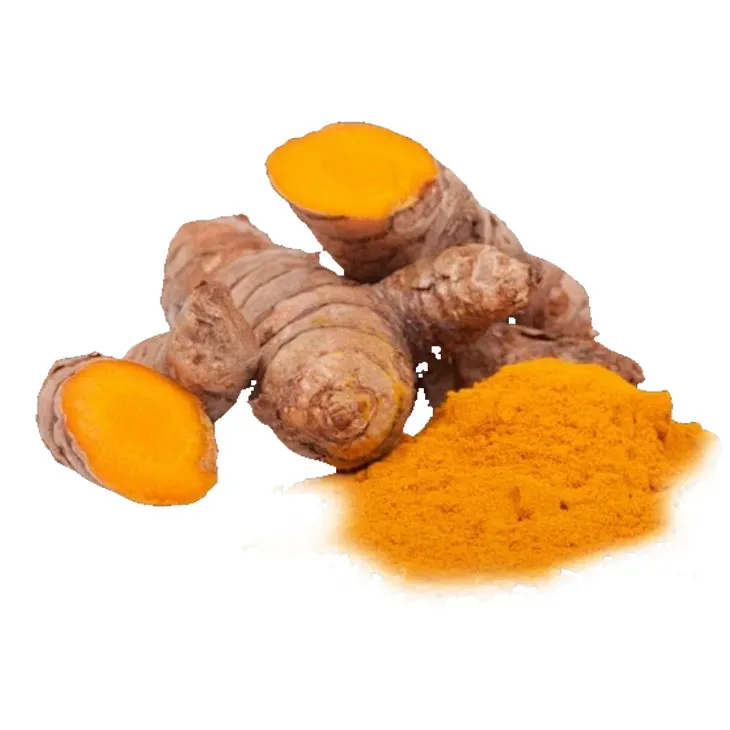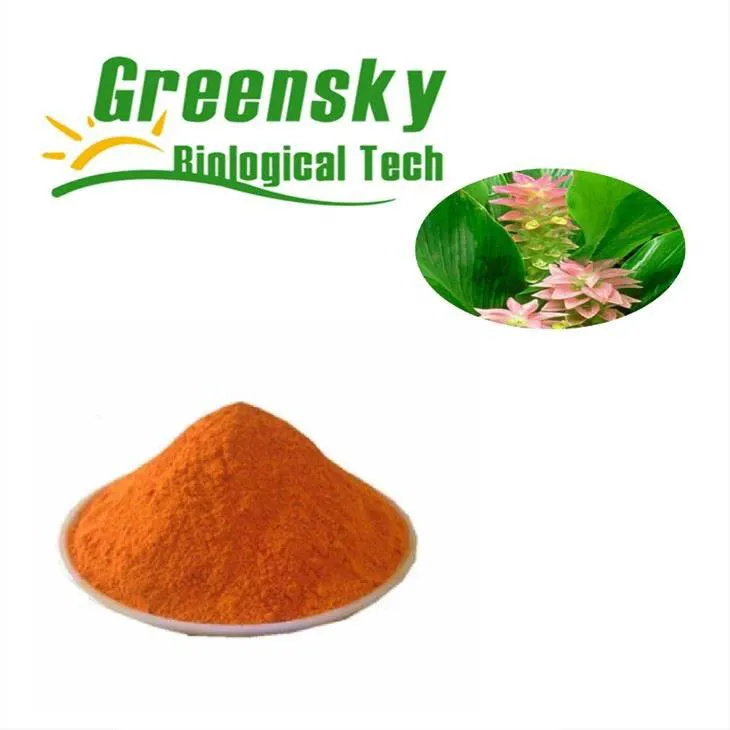- 0086-571-85302990
- sales@greenskybio.com
The Best Herb for Treating Anxiety and Insomnia: Curcumin.
2024-11-12

1. Introduction
Anxiety and insomnia are two common health issues that can significantly impact a person's quality of life. In recent years, Curcumin has emerged as a potential natural remedy for these problems. Curcumin is a compound found in the spice turmeric, which has been used in traditional medicine for centuries. This article aims to explore the various aspects of Curcumin in relation to treating anxiety and insomnia.

2. Origin and Chemical Composition of Curcumin
Origin: Turmeric (Curcuma longa) is a perennial plant native to South Asia. It has a long history of use in Ayurvedic and traditional Chinese medicine. The bright yellow color of turmeric comes from curcuminoids, of which curcumin is the most abundant and well - studied.
Chemical Composition: Curcumin has a unique chemical structure. Its molecular formula is C₂₁H₂₀O₆. It contains phenolic and β - diketone groups, which are thought to be responsible for many of its biological activities. These chemical groups enable curcumin to interact with various molecules in the body, including those involved in the regulation of mood and sleep.

3. How the Chemical Composition Contributes to Therapeutic Effects
3.1. Anti - inflammatory Properties
Chronic inflammation has been linked to anxiety and sleep disorders. Curcumin's anti - inflammatory properties can help reduce inflammation in the body. It inhibits the activity of various inflammatory mediators such as cytokines and cyclooxygenase - 2 (COX - 2). By reducing inflammation, curcumin may help improve the overall physiological state, which in turn can have a positive impact on mood and sleep.
3.2. Antioxidant Activity
Oxidative stress is another factor associated with anxiety and insomnia. Curcumin is a powerful antioxidant. It can scavenge free radicals in the body, protecting cells from oxidative damage. This antioxidant activity may help regulate the body's stress response system, which is often dysregulated in individuals with anxiety and sleep problems.
3.3. Interaction with Neurotransmitters
Curcumin can interact with neurotransmitters in the brain. It has been shown to modulate the levels of serotonin, dopamine, and gamma - aminobutyric acid (GABA). Serotonin is often referred to as the "feel - good" neurotransmitter and is involved in mood regulation. Dopamine is associated with motivation and reward. GABA is an inhibitory neurotransmitter that helps calm the nervous system. By influencing these neurotransmitters, curcumin may help relieve anxiety and improve sleep.

4. Scientific Research Findings on Efficacy
4.1. Animal Studies
Several animal studies have demonstrated the potential of curcumin in treating anxiety and insomnia. In rodent models, curcumin has been shown to reduce anxiety - like behavior. For example, in the elevated plus - maze test, animals treated with curcumin spent more time in the open arms, indicating reduced anxiety. In terms of sleep, curcumin has been shown to increase total sleep time and improve sleep quality in some animal studies.
4.2. Human Studies
There have also been some human studies on curcumin's effects on anxiety and insomnia. In some small - scale clinical trials, participants who took curcumin supplements reported a reduction in anxiety symptoms. However, the results are not entirely consistent across all studies. Some studies have found only a mild improvement, while others have not shown significant effects. Regarding sleep, some human studies suggest that curcumin may help improve sleep latency (the time it takes to fall asleep) and increase sleep duration, but more research is needed to confirm these findings.

5. Safety and Possible Side Effects of Curcumin
5.1. Safety Profile
Overall, curcumin is considered safe for most people when taken in appropriate amounts. It has been used in traditional medicine for a long time without major safety concerns. However, it is important to note that curcumin can interact with certain medications, such as blood thinners. People taking such medications should consult their doctor before taking curcumin supplements.
5.2. Possible Side Effects
Although curcumin is generally safe, some people may experience mild side effects. These can include digestive issues such as nausea, diarrhea, or abdominal discomfort. These side effects are usually dose - dependent and can often be alleviated by reducing the dose or taking curcumin with food.

6. Practical Ways to Incorporate Curcumin into Daily Life
6.1. Dietary Sources
One of the easiest ways to get curcumin is through dietary sources. Turmeric is a common spice used in cooking, especially in Indian and Southeast Asian cuisines. Adding turmeric to dishes such as curries, stir - fries, or smoothies can increase curcumin intake. However, it should be noted that the amount of curcumin in food is relatively small compared to what can be obtained from supplements.
- Curry dishes: A traditional Indian curry often contains a significant amount of turmeric, providing a source of curcumin.
- Golden milk: This is a popular beverage made with turmeric, milk (or a milk substitute), and other spices. It is not only a delicious way to consume curcumin but also has potential health benefits.
6.2. Supplements
If a higher dose of curcumin is desired for therapeutic purposes, curcumin supplements can be considered. There are different forms of curcumin supplements available on the market, such as curcumin capsules and tablets. When choosing a supplement, it is important to look for a high - quality product. Some supplements may contain additional ingredients to enhance curcumin's absorption, such as piperine (found in black pepper).
- Consult a healthcare provider: Before starting any new supplement, it is advisable to consult a doctor or a registered dietitian. They can provide advice on the appropriate dose and potential interactions with medications.
- Follow the recommended dose: Different curcumin supplements may have different recommended doses. It is important to follow the instructions on the product label to ensure safety and effectiveness.
7. Conclusion
Curcumin shows promise as a natural remedy for anxiety and insomnia. Its origin, chemical composition, and various biological activities suggest that it may have therapeutic effects on these conditions. While scientific research has provided some evidence of its efficacy, more studies are needed to fully understand its potential and to establish optimal dosing and treatment regimens. Overall, for those suffering from anxiety and insomnia, incorporating curcumin into their daily life through dietary sources or supplements may be a viable option, but it should be done with caution and under the guidance of a healthcare professional.
FAQ:
What is curcumin?
Curcumin is a natural compound. It is the main active ingredient in turmeric, a spice commonly used in cooking. Chemically, it has a unique structure that gives it various biological properties.
How does curcumin treat anxiety?
Curcumin may treat anxiety through multiple mechanisms. It can interact with neurotransmitter systems in the brain, such as modulating serotonin levels. Serotonin is a key neurotransmitter associated with mood regulation. Also, its antioxidant and anti - inflammatory properties might help reduce oxidative stress and inflammation in the brain, which are often related to anxiety.
How does curcumin help with insomnia?
For insomnia, curcumin may work by reducing stress and inflammation in the body. Stress and inflammation can disrupt the body's normal sleep - wake cycle. By alleviating these factors, curcumin can promote a more regular sleep pattern. Additionally, it may have an impact on the hormonal systems involved in sleep regulation.
Is curcumin safe to use?
Generally, curcumin is considered safe for most people when used in appropriate amounts. However, some people may experience mild side effects such as digestive discomfort, especially when taken in large doses. People with certain medical conditions, like gallbladder problems or bleeding disorders, should consult a doctor before using curcumin supplements.
How can one incorporate curcumin into daily life?
One can incorporate curcumin into daily life in several ways. It can be consumed as a spice in cooking, for example, adding turmeric (which contains curcumin) to curries, soups, or stir - fries. Another option is taking curcumin supplements, which are available in various forms such as capsules or tablets. However, it's important to follow the recommended dosage.
Related literature
- The Therapeutic Potential of Curcumin for Anxiety Disorders: A Review of Preclinical and Clinical Evidence"
- "Curcumin and Sleep: A Review of the Current Evidence"
- "Evaluating the Safety and Efficacy of Curcumin in the Treatment of Insomnia"
- ▶ Hesperidin
- ▶ Citrus Bioflavonoids
- ▶ Plant Extract
- ▶ lycopene
- ▶ Diosmin
- ▶ Grape seed extract
- ▶ Sea buckthorn Juice Powder
- ▶ Fruit Juice Powder
- ▶ Hops Extract
- ▶ Artichoke Extract
- ▶ Mushroom extract
- ▶ Astaxanthin
- ▶ Green Tea Extract
- ▶ Curcumin
- ▶ Horse Chestnut Extract
- ▶ Other Product
- ▶ Boswellia Serrata Extract
- ▶ Resveratrol
- ▶ Marigold Extract
- ▶ Grape Leaf Extract
- ▶ New Product
- ▶ Aminolevulinic acid
- ▶ Cranberry Extract
- ▶ Red Yeast Rice
- ▶ Red Wine Extract
-
Saponin Extract
2024-11-12
-
Reishi mushroom extract
2024-11-12
-
Hawthorn Extract
2024-11-12
-
Bilberry Extract
2024-11-12
-
Hericium erinaceus extract powder
2024-11-12
-
Avocado Extract Powder
2024-11-12
-
Centella Asiatica Extract
2024-11-12
-
Chasteberry Extract
2024-11-12
-
Golden Seal Extract
2024-11-12
-
Sophora Flavescens Root Extract
2024-11-12





















